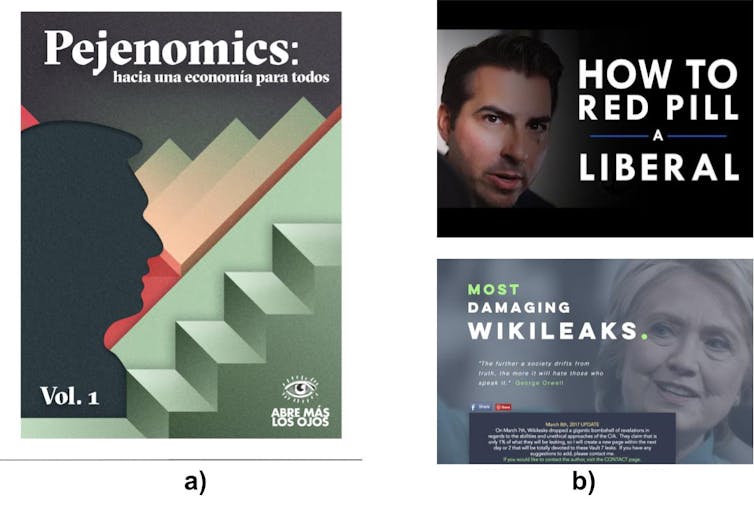Savvy social media strategies boost anti-establishment political wins
- Written by Saiph Savage, Assistant Professor of Computer Science, West Virginia University
Mexico’s anti-establishment presidential candidate, Andrés Manuel López Obrador, faced opposition from the mainstream media[1]. And he spent 13 percent less on advertising[2] than his opponents. Yet the man commonly known by his initials as “AMLO” went on to win the Mexican presidency in a landslide with over 53 percent of the vote[3] in a four-way race in July.
That remarkable victory was at least partly due to the social media strategies[4] of the political activists who backed him. Similar strategies appeared in the 2016 U.S. presidential election and the 2017 French presidential race[5].
Our[6] lab[7] has been analyzing these social media activities[8] to understand how they’ve worked to threaten – and topple – establishment candidates. By analyzing more than 6 million posts from Reddit, Facebook and Twitter, we identified three main online strategies: using activist slang, attempting to “go viral” and providing historical context.
Some of these strategies might simply be online adaptations of long-standing strategies used in traditional offline campaigning. But others seem to be new ways of connecting and driving people to the polls. Our lab was interested in understanding the dynamics behind these online activists in greater detail, especially as some had crossed over from being merely supporters – even anonymous ones – not formally affiliated with campaigns, to being officially incorporated in campaign teams[9].
Integrating activist slang
Some political activists pointedly used slang in their online conversations, creating a dynamic that elevated their candidate as an opponent of the status quo. Trump backers, for instance, called themselves “Deplorables[10],” supporting “the God Emperor[11]” Trump against “Killary[12]” Clinton.
AMLO backers called themselves “AMLOVERS” or “Chairos,”[13] and had nicknames for his opponents, such as calling the other presidential candidate, Ricardo Anaya, “Ricky Riquin Canayin[14]” – Spanish for “The Despicable Richy Rich.”
Efforts to ‘go viral’
Some political activists worked hard to identify the material that was most likely to attract wide attention online and get media coverage. Trump backers, for instance, organized on the Discord chat service[15] and Reddit forums to see which variations of edited images of Hillary Clinton were most likely to get shared and go viral. They became so good at getting attention for their posts that Reddit actually changed its algorithm to stop Trump backers[16] from filling up the site’s front page with pro-Trump propaganda.
Similarly, AMLO backers were able to keep pro-AMLO hashtags trending on Twitter, such as #AMLOmania, in which people across Mexico made promises[17] of what they would do for the country if AMLO won. The vows ranged from free beer and food in restaurants to free legal advice.
For instance, an artist promised[18] to paint an entire rural school in Veracruz, Mexico, if AMLO won. A law firm[19] promised to waive its fees for 100 divorces and alimony lawsuits if AMLO won. The goal of citizen activists was to motivate others to support AMLO[20], while doing positive things for their country.
The historian-style activists
 Historian-style activists created explanatory materials to share on social media: a) backing AMLO with a visual description of his economic plan; b) Helping Trump backers ‘red-pill liberals,’ waking them up to a conservative reality.
Saiph Savage and Claudia Flores-Saviaga, CC BY-ND[21]
Historian-style activists created explanatory materials to share on social media: a) backing AMLO with a visual description of his economic plan; b) Helping Trump backers ‘red-pill liberals,’ waking them up to a conservative reality.
Saiph Savage and Claudia Flores-Saviaga, CC BY-ND[21]
Some anti-establishment activists were able to recruit more supporters by providing detailed explanations of the political system as they saw it. Trump backers, for instance, created electronic manuals advising supporters[22] how to explain their viewpoint to opponents to get them to switch sides. They compiled the top WikiLeaks revelations about Hillary Clinton[23], assembled explanations of what they meant and asked people to share it[24].
Pro-AMLO activists did even more, creating a manual[25] that explained Mexico’s current economics[26] and how the proposals of their candidate would, in their view, transform and improve Mexico’s economy[27].
Our analysis identified that one of the most effective strategies was taking time to explain the sociopolitical context. Citizens responded well to, and engaged with, specific reasoning about why they should back specific candidates.
As the U.S. midterm elections approach, it’s worth paying attention to whether – and in what races – these methods reappear; and even how people might use them to engage in fruitful political activism that brings the changes they want to see. You can read more about our research in our new ICWSM paper[28].
References
- ^ opposition from the mainstream media (thehill.com)
- ^ spent 13 percent less on advertising (www.animalpolitico.com)
- ^ over 53 percent of the vote (www.economist.com)
- ^ the social media strategies (www.forbes.com.mx)
- ^ 2017 French presidential race (theconversation.com)
- ^ Our (www.saiph.org)
- ^ lab (humancomputerinteraction.wvu.edu)
- ^ analyzing these social media activities (arxiv.org)
- ^ officially incorporated in campaign teams (www.forbes.com.mx)
- ^ Deplorables (en.wikipedia.org)
- ^ the God Emperor (www.nytimes.com)
- ^ Killary (old.reddit.com)
- ^ “AMLOVERS” or “Chairos,” (en.wikipedia.org)
- ^ Ricky Riquin Canayin (www.dallasnews.com)
- ^ organized on the Discord chat service (www.buzzfeednews.com)
- ^ changed its algorithm to stop Trump backers (gizmodo.com)
- ^ people across Mexico made promises (www.eluniversal.com.mx)
- ^ artist promised (twitter.com)
- ^ law firm (twitter.com)
- ^ to motivate others to support AMLO (www.animalpolitico.com)
- ^ CC BY-ND (creativecommons.org)
- ^ electronic manuals advising supporters (old.reddit.com)
- ^ top WikiLeaks revelations about Hillary Clinton (www.mostdamagingwikileaks.com)
- ^ share it (www.reddit.com)
- ^ a manual (drive.google.com)
- ^ explained Mexico’s current economics (www.reuters.com)
- ^ transform and improve Mexico’s economy (www.forbes.com.mx)
- ^ new ICWSM paper (www.aaai.org)
Authors: Saiph Savage, Assistant Professor of Computer Science, West Virginia University

